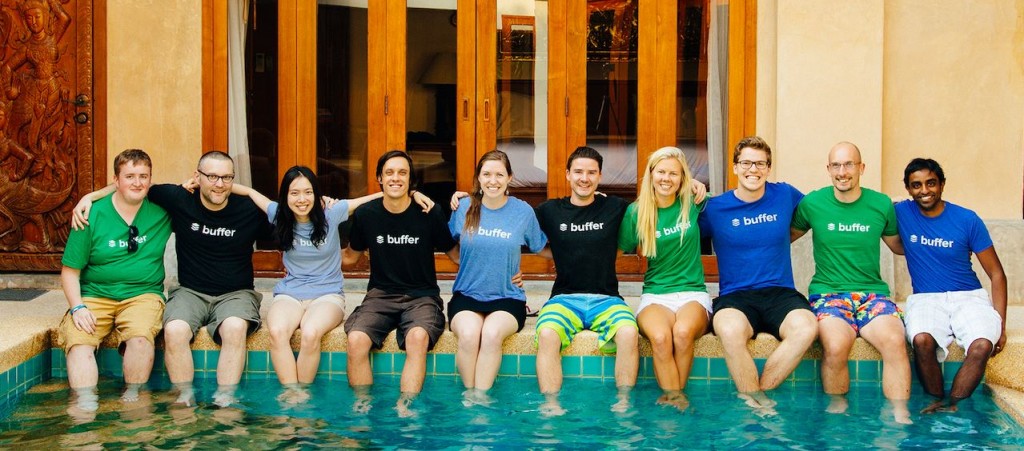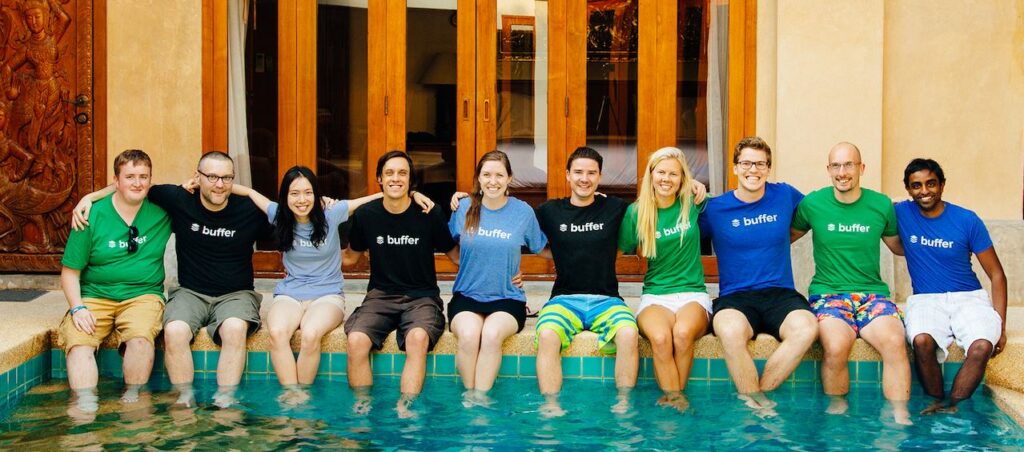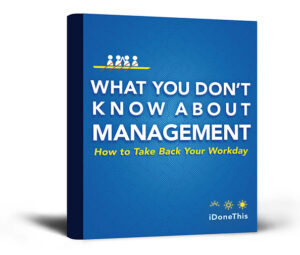Here’s an excerpt from our fresh-of-the-presses eBook, What You Don’t Know About Management: How to Take Back Your Work Day. If you like what you read, download the 50+ page eBook for free!

For the amount of our lives that we spend working, you’d think it would be more common to spend time tending to our coworker relationships. Yet, the default is to treat the social aspects of work as a given instead of managing them in any significant way.
Team-building goes way beyond trust falls. Successful people recognize the importance of establishing and cultivating meaningful connections.
The Downsides of Detachment
The general state of connectedness, at least in the American workplace, is a sad one. According to a 2012 Gallup poll, 70% of workers are disengaged. Specifically:
- 52% are disengaged (feeling less connected, doing stuff to get by)
- 18% are actively disengaged (at odds with the organizations and managers)
- 30% are engaged (committed and connected)
With 70% of your crew checked out, not rowing and pulling their weight, with some of them even actively holding you back — how do you move forward? How does that environment impact you at work every day?
When you’re a member of a productive crew that’s going places, you feel you’re building towards something and doing it together. Teamwork isn’t just a bunch of individuals doing their own thing, snapped together snugly like Lego pieces, but operating through interaction and collaboration.
Teamwork is about the shared purpose, team trust, and support of camaraderie. As Christine M. Riordan writes in a Harvard Business Review post:
Studies have shown that soldiers form strong bonds during missions in part because they believe in the purpose of the mission, rely on each other, and share the good and the bad as a team. In short, camaraderie promotes a group loyalty that results in a shared commitment to and discipline toward the work.
We often treat motivation as if it exists in an individual bubble, a personal puzzle to crack. Yet many other factors — especially other people — influence our drive throughout the day. In their rigorously-researched book, The Progress Principle, Harvard Business School professor Teresa Amabile and psychologist Steven Kramer identify one vital ingredient in the recipe to fulfillment and thriving at work — the nourishing element of human connection. The reason is basic: “As humans, we want others to respect, recognize, care for, and enjoy us. When they do, we revel in the positive emotions of joy, pride, and even love. And we are motivated to contribute something wonderful.”
Recognition and gratitude, encouragement, emotional support, and camaraderie are all nourishers — and these are all things that anyone can contribute.
An analysis of over 5 million Gallup interviews revealed that close work friendships can increase employee satisfaction by 50%. And in his research, Shawn Achor found that people who proactively developed work relationships by providing social support and initiating interactions — “people who picked up slack for others, invited coworkers to lunch, and organized office activities” for example — were 40% more likely to be promoted and 10 times more like to be engaged at work.
Feeling isolated at work leads to demoralization, detachment, and even depression. In the first study to empirically analyze the effect of loneliness on work performance, Sigal Barsade and Hakan Ozcelik looked at the experiences of hundreds of employees and confirmed how loneliness leads to withdrawal from work as well as weakened productivity, motivation, and performance.
Notably, they found that “co-workers can recognize this loneliness and see it hindering team member effectiveness,” and because this downward spiral is noticeable, it’s an important opportunity not to leave your teammate in the lurch. Loneliness is a personal emotion, but isolation and detachment aren’t private concerns. These effects reverberate, becoming a concern that impacts the group, organization, and community.
How to Strengthen Connections & Camaraderie
Though bosses and cultural inertia can pose difficult challenges in transforming collective detachment to engagement, there are still leverage points you can use to improve camaraderie. Instead of relying on change to come from the top, consider what you can do to manage your peers across the cubicle or the hall.
“Attention is the rarest and purest form of generosity,” French philosopher Simone Weil once wrote, and in what seems to be our increasingly head-down, busily streaming lives, that seems a harder truth than ever. Wholehearted attention is how you connect to others and to the world around you.
People work better when they feel a sense of togetherness or cohesion, which provides a basis for mutual accountability to each other. Here are a few simple ways to create and strengthen that basis:
1. Put on your own oxygen mask first.
First, be kind and attentive to yourself. Poorer quality connections can be corrosive, eroding energy and ramping up stress, anxiety, and fear — feelings that we shouldn’t merely tune out. Often we put our heads down to get work done or feel like we just have to get through the day, forgoing the chance to listen to ourselves, much less other people.
Then consider the nourishment factor — acts of generosity, giving your attention to others, expressing gratitude, and providing support — to do small things that can ultimately strengthen teams, making them more resilient and enduring, and collectively thrive.
Examining the state of your connectedness may even prompt you to assess whether it’s time to leave your job, especially if you’re dealing with an unhealthy work environment, unchecked workplace bullying or harassment, or simple disengagement.
2. Find common ground.
At Buffer, sharing has become almost as natural as breathing, so that their take on “do things, tell people” goes deep.
Radical transparency is a major company value, and the swiftly growing team shares a broad range of details — from the nitty-gritty such as salary and equity details to what they’re getting done every day to self-improvement goals. So whether you’re trying to stick to a fitness regime, stuck on a particular work problem, or had a great one-on-one, sharing paves the way for filling people in, receiving help, and keeping motivated.
By creating an open and supportive environment, Buffer transforms the inherently vulnerable act of sharing personal and work details into an opportunity to connect, spark richer conversations, show support, serve as a sounding board, and learn from each other — and that’s turned out to be a major competitive advantage for the company. It’s one important way the company can focus on progress, aiming higher, and getting better.
Your team can bake this kind of interaction into some of the processes and tools you use. The weekly Snippets system first adopted at Google, for example, takes the “send 1 email to your boss” idea and scales it across an organization, providing a window into what everyone is up to in the company. You get a weekly email asking what you did last week and what you plan to do in the upcoming week, and everyone’s replies get compiled in a public space and distributed automatically the following day by email.
In any case, taking time to talk, listen, and share about interests, work, and goals doesn’t require formal meetings or tools to happen. Camaraderie is built from common ground — and you can’t discover common ground until you have conversations with whom you spend a significant part of your day.
3. The Power of a Simple Thank You
A simple thanks to indicate your appreciation of your peers’ work and efforts isn’t just motivating, it’s the right thing to do. The workplace is actually the worst place to find gratitude, according to a 2012 survey by the John Templeton Foundation. 60% of people reported that they never expressed gratitude, or at most “perhaps once a year.”
The implication is depressing: day after day, people’s effort and hard work get taken for granted — and feeling like you’re toiling away without appreciation is one big step closer to stop trying.
Gratitude is a powerful motivator. As Adam Grant and Francesca Gino found in their research, when people received recognition, they helped others for longer — without even being asked to do so. In one of their studies, a group of fundraisers, who had the usually thankless job of asking alumni for donations, received a visit from a director of annual giving, who told them, “I am very grateful for your hard work. We sincerely appreciate your contributions to the university.”
That simple expression of thanks resulted in more than a 50% increase in the number of calls in a single week. Gratitude, Grant and Gino explain, increases our feeling of efficacy and self-worth, which sets us up to continue contributing.
Take five minutes to give a shout-out to someone, even if it’s once a week. Turn Eric’s one weekly status email idea into a gratitude email and make it a positive way to interact with your coworkers. Make saying thanks or recognizing someone for their efforts, from friends and family to people at work, part of your recurring to-do list.
4. Increase the visibility of other people’s work.
“You should always highlight what your coworkers are up to if they’re doing good work,” encourages Melody Kramer, digital strategist at NPR. “If you’re speaking to one of your managers and you highlight somebody else’s work, that could be very good for them. I really like the idea of building everyone up at the same time.”
Melody created a daily internal newsletter, circulated among 450 people across NPR, to do just that, strengthening the organization by passing on information about staffers’ social media and digital experiments. Now the newsletter contents are shared on a Tumblr site, distributing helpful information to the general public.
The new platform also provides an approachable way to share and recognize each others’ wins, especially for people who hesitate to show off work they’re proud of. “I can completely understand that it’s very hard,” Melody notes. “You don’t want to be constantly waving around things that you did because that’s not a personality trait that people necessarily like. But there is value in sharing success stories, and if you have a platform for doing that, then people feel much more comfortable.”
5. Just do something nice.
When you give, it boosts your happiness — increasing feelings of happiness, flow, connectedness, and intrinsic motivation.
In their four-week study at a large Madrid company, Sonja Lyubomirsky & Joe Chancellor told designated givers to carry out acts of kindness for a randomly assigned colleague. Not only did recipients benefit, after a month givers also reported more long-term positive impacts like improved flow, happiness, and life satisfaction. Plus, the acts of kindness kickstarted a ripple effect of paying it forward, improving collective spirits.
Small, authentic gestures can make a fortifying difference to protect against the emotional and motivational paper cuts we accumulate as the workday goes by. It’s about quality, not quantity, and small moments of true attention, support, encouragement, and fun can charge people up with a much-needed spark.
In fact, people mistake the strength of small acts of kindness, according to research by Stanford University’s Melanie Rudd and Jennifer Aaker and Harvard Business School’s Michael Norton. Small actions with simple, concrete goals (like making someone smile) instead of intimidating, fuzzy goals (like making someone happy) makes them much more doable and likely to happen. Again, Rudd and her colleagues found that not only do these small acts of kindness improve the well-being of the action’s recipients, they’re even more effective in boosting the giver’s happiness.
Managing your work relationships can take gumption and thought because you’re figuring out ways to connect with people who aren’t necessarily your friends but more than acquaintances. But you can always start small. Here are a few simple suggestions to get you started:
- buy someone a coffee
- cheer up someone who’s having a bad day
- include someone who tends to be left out in group activities
- express encouragement to someone struggling with a problem or a new skill
- recognize something great a coworker did
- lend a hand beyond your normal job duties
- learn something new about a person
- get away from the desk and take a walk together
- invite people out for lunch, ice cream, or happy hour.
This excerpt came from our fresh-of-the-presses eBook, What You Don’t Know About Management: How to Take Back Your Work Day. If you liked what you read, download the 50+ page eBook for free!
P.S. If you liked this article, you should subscribe to our newsletter. We’ll email you a daily blog post with actionable and unconventional advice on how to work better.


